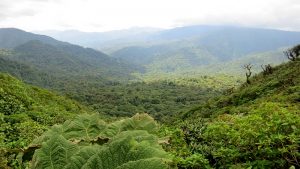The executive’s initiative was widely welcomed, notably by a press release from the American development agency USAID, which is currently investing $ 57 million (51.2 million euros) in support projects for the protection of forests.
In March 2019, Andry Rajoelina had already announced as part of his general policy his intention to reforest an area of 40,000 ha per year with a minimum of 40 million young plants endemic to the Big Island. During the Council of Ministers on February 27, 2019, the ambition was to “cover Madagascar with forests”. “Nurseries have been set up throughout the country through the ministry,” announced the press release from the Malagasy presidency, where young plants will be made available free of charge for the whole campaign. ”
But the modus operandi of Sunday’s operation, supposed to set the tempo for this reforestation campaign, raises some questions.
The initiative originates from the Madagascan company Bôndy, which had invited Madagascar to participate in the Guinness book of records for reforestation by planting 1 million trees in one day. To do this, the company completed a thick set of requirements with the institution in June 2019. “Then the government contacted us in September to participate in this idea for a world record,” said Max Fontaine, the director and co-founder of the company.
“The cost of the project is estimated at several hundred thousand euros with all the arrangements around reforestation: a life camp for planters, soldiers for security … But we never received the money which was supposed to be allocated for this reforestation,” continues the young entrepreneur, “and we learned that the implementation of the project had started without us, while we had the technical expertise.” Annoyed, Bôndy withdrew from the project and canceled its participation in the Guinness World Records. “There were simply incompatibilities in terms of specifications,” explains Luciano Razafimahefa, communications officer at the environment ministry.
According to the results of a cartographic study released in 2015, Madagascar lost 965,000 ha of forests from 2005 to 2013, or approximately 120,000 ha per year between 2010 and 2013. The causes are multiple: livestock, mines, forest fires and in particular the tavy, slash and burn agriculture, as well as the commercial exploitation of precious woods but also for energy production and construction.
Reforestation is therefore essential to meet national demands for forest wood, which have exploded with demography. But it is a meticulous process that requires a lot of follow-up: it is not enough to put a plant in the ground for it to work. “This is a tremendous craze that was aroused on Sunday, analyzes Gérard Rambeloarisoa, former teacher-researcher at the University of Ankatso, in Antananarivo, on reforestation. However, forestry is a long-term project. The record of trees planted in one day is a bad indicator. Reforestation is valued over ten years, not a year of planting. ”
For this former executive director of the Foundation for Protected Areas and Biodiversity of Madagascar, too many technical details have been overlooked which risk damaging its sustainability and “breaking” the momentum to reforest. “60 million trees compared to the rate of deforestation in Madagascar is not much. But compared to our ability to manage in the long term, that’s a lot,” he concludes.
“The environment ministry has scheduled a team of foresters to monitor reforestation this year,” said Luciano Razafimahefa. They will stay put and when there is no rain, they are the ones who will water the plants one by one, and will then make firewalls to avoid bush fires. The environment ministry’s communications officer says local people have been sensitized to sustain this reforestation.
“We obviously welcome the initiative,” explains Nanie Randriarimanana, director of the non-governmental organization World Wildlife Fund (WWF). But the environment ministry was too late to prepare the nurseries so that the reforestation could take place on January 19: the plants were still too young. Beyond the declaration, Madagascar would need a more specific national reforestation plan over five years. ”
Since independence in 1960, the Big Island has lost 44% of its natural forests, according to a study published in 2018 in the scientific journal Biological Conservation and coordinated by an ecologist from the International Center for Agronomic Research for Development (CIRAD).
Source: Le Monde








